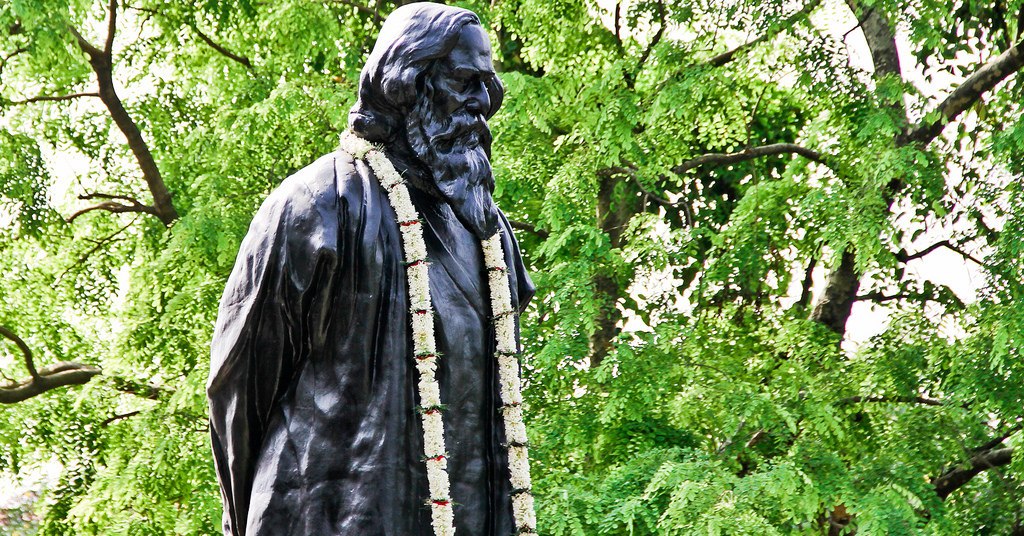Kabiguru Rabindranath Tagore’s vision of a nation was educated by his dream of a fearless mind, a boundless idea of identity and community, united by knowledge, multiculturalism and internationalism. With processes of Globalisation and looking-inward policies surging and tugging at each other increasingly, the tenability of Tagore’s ideas are felt most pressingly now, more than ever before.
Tagore was a poet, a playwright, an artist and a keen social scientist in his understanding of human behaviour, of political machines and cultural patterns. In the next few days, India shall celebrate yet another Independence Day, remember its martyrs, take pride, and rightfully so, in its republic, in its strife of self-determination and in the triumph of its democracy. And among those remembered will be Tagore, whose contribution to shaping both the discourse around nationhood and the narrative of the freedom struggle is undeniable.
On his death anniversary it becomes pertinent, then, to understand Tagore’s vision for India, a nation he then viewed as different from the definitions of Western Nationalism. India, to his mind, is an aspiration whose salvation lay in inclusion, acceptance, tolerance, coexistence and social freedoms accorded to all citizens, viewed with equity. For him, the true freedom of India lay in the acknowledgement of its diversity and in it the uniqueness of its Nationalism: the rejection of homogeneity or assimilation and a celebration, instead, difference in choices, practice and tradition.
Through his vast legacy of art, music, poetry and prose Tagore has left the world both an incisive understanding of the human mind and a strong-willed political message. In his time Tagore had hoped for an open world, a parley of cultures and minds, a “heaven of freedom” that is not threatened but elevated by knowledge, by questions and by an ambition of holistic growth. Tagore’s remains with us most through his vision of a free world in which his country breaks away from the fetters of selfishness, of a capsized, restricted version of a nation and the pomposity and superiority that traditional ideas of Nationalism are lined with.
আজও প্রাসঙ্গিক কবিগুরু রবীন্দ্রনাথ ঠাকুর
‘আজি হতে শতবর্ষ পরে, কে তুমি পড়িছ বসি, আমার কবিতা খানি’
আজ ২২শে শ্রাবণ। আজকের দিনটি উৎসর্গিত কবিগুরু রবীন্দ্রনাথ ঠাকুরের প্রতি। ২০১৭তে দাঁড়িয়েও কতটা প্রাসঙ্গিক কবি, তা বোঝা যায় ওনারই লেখা এই লাইনের মাধ্যমে। দূরদর্শী ওই মানুষটি ঠিক বলে গেছিলেন, উনি না থাকলেও ওনার লেখা চির অমর হয়ে থাকবে। বিশেষ করে তাঁর দেশাত্ববোধক চিন্তাধারা আজকের রাজনৈতিক ও সামাজিক প্রেক্ষাপটে অত্যন্ত গুরুত্বপূর্ণ।
রবীন্দ্রনাথ চেয়েছিলেন এমন এক ভারতবর্ষ যেখানে চিত্ত ভয়শূন্য, জ্ঞান মুক্ত এবং শির উচ্চ। কিন্তু আজ এক শ্রেণীর মানুষ যেভাবে সাম্প্রদায়িকতার বিষ ছড়াচ্ছে সারা দেশে, তাতে রবীন্দ্রনাথের ভাবনা শুধু কবিতার পংক্তি মাত্র থেকে গেছে। রবীন্দ্রনাথ তাঁর গান, কবিতা ও প্রবন্ধে সমস্ত ক্ষুদ্র ধর্মভেদ জাতিভেদের উর্দ্ধে উঠে আন্তর্জাতিক ভাতৃত্ববোধের কথা বলে গেছেন। আজকের এই অশান্ত, অস্থির পরিস্থিতে তাই কবি প্রাসঙ্গিক।
১৯০৫ সালে ব্রিটিশদের বঙ্গভঙ্গ করার সিদ্ধান্তের বিরুদ্ধে তিনি আয়োজন করেন রাখীবন্ধন উৎসবের। আজ যারা ধর্মীয় ভাবাবেগকে কাজে লাগিয়ে ক্ষুদ্র রাজনীতির খেলা খেলতে চাইছে, এই রাখীবন্ধন উৎসব হয়ে উঠেছে সম্প্রীতির প্রতীক, সংস্কৃতির প্রতীক।
আজকের দিনে দাঁড়িয়ে কবিগুরু হয়তো আবারও লিখতেন –
“নাগিনীরা চারিদিকে ফেলিতেছে বিষাক্ত নিঃশ্বাস
শান্তির ললিতবাণী শুনাইবে ব্যর্থ পরিহাস”।
আজকের ভারতে এই ভেদাভেদের রাজনীতি যখন মাথাচাড়া দিয়ে উঠতে চাইছে সেই সময় কবিগুরুর গান আবার সৃষ্টি করতে পারে সাম্প্রদায়িক সম্প্রীতির বাতাবরণ। তিনি ছিলেন সব ধর্মের, সব সম্প্রদায়ের | তাঁর দূরদৃষ্টি ক্ষুদ্র গণ্ডীর বলয় থেকে সর্বদা অগ্রসর হয়েছে বিশ্বায়নের পথে | এ জন্যই রবীন্দ্রনাথ বিশ্বকবি | কোন দেশ বা বিশেষ কোন অঞ্চলের সীমারেখায় তাঁকে আটকে রাখা ন্যায়সঙ্গত হবে না | কারণ তিনি সর্বজনীন | তাঁর লেখা জাতীয় সঙ্গীত তাই সারা দেশকে এক হওয়ার শক্তি জোগায়। তাই, ১৫০ বছরের বেশী সময় পেরিয়ে গেলেও আজও ভারতবর্ষের সাম্প্রদায়িক সম্প্রীতি রক্ষা করতে তাঁর গান, প্রবন্ধ হয়ে উঠুক ভারতবাসীর পাথেয়।

